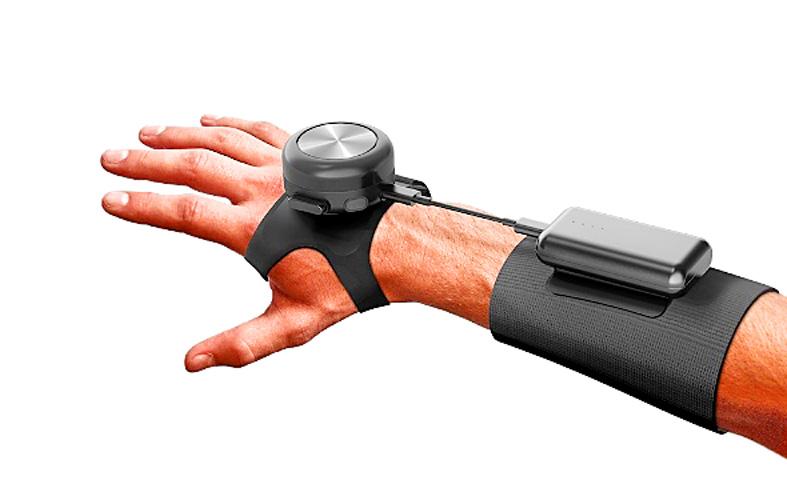Hon Hai Precision Industry Co (鴻海精密) yesterday announced a strategic partnership with British medical device start-up GyroGear Co, as the world’s largest contract electronics maker aims to manufacture GyroGear’s flagship product, the GyroGlove.
Hon Hai would invest £1 million (US$1.38 million) in GyroGear to acquire one seat on the firm’s board of directors, the world’s largest contract electronics maker said.
The GyroGlove is the first wearable medical device developed for people with hand tremors, such as those with Parkinson’s disease or essential tremor disorder, Hon Hai said in a statement.

Photo courtesy of Hon Hai Precision Industry Co
More than 200 million people worldwide frequently experience hand tremors, and more than half of them live in Asia, the company said.
According to the British firm’s Web site, GyroGear founder Faii Ong developed the idea of the GyroGlove as a medical student when he noticed that older people with hand tremors had problems eating, and their health deteriorated due to malnutrition.
“It functions exactly like a top,” Ong said in an interview with Channels Television, describing the gyroscope positioned in the GyroGlove. “Just as the top spins, it tries to stay upright. In the same way, the glove counteracts your hand tremors.”
A Channels Television video showed a patient with essential tremors paint her nails with the aid of the wearable device, even though the GyroGlove, according to the company, is still in development and not yet market-ready.
“We believe that our collaboration with Hon Hai will help tremor patients in Asia,” Ong said.
Hon Hai said that the partnership would strengthen its presence in the medical-device industry.
It would also help Hon Hai “align with our core mission of making people’s lives better through the power of technology,” the company said.
Hon Hai added that it would obtain exclusive rights to produce and sell the wearable glove in Asia.
The two firms are also collaborating to establish a research-and-development facility in Taiwan focused on software and hardware, Hon Hai said.
The investment is part of Hon Hai’s bid to explore sources of growth and expand from manufacturing to hardware and software integration.

On Tuesday, US President Donald Trump weighed in on a pressing national issue: The rebranding of a restaurant chain. Last week, Cracker Barrel, a Tennessee company whose nationwide locations lean heavily on a cozy, old-timey aesthetic — “rocking chairs on the porch, a warm fire in the hearth, peg games on the table” — announced it was updating its logo. Uncle Herschel, the man who once appeared next to the letters with a barrel, was gone. It sparked ire on the right, with Donald Trump Jr leading a charge against the rebranding: “WTF is wrong with Cracker Barrel?!” Later, Trump Sr weighed

HEADWINDS: Upfront investment is unavoidable in the merger, but cost savings would materialize over time, TS Financial Holding Co president Welch Lin said TS Financial Holding Co (台新新光金控) said it would take about two years before the benefits of its merger with Shin Kong Financial Holding Co (新光金控) become evident, as the group prioritizes the consolidation of its major subsidiaries. “The group’s priority is to complete the consolidation of different subsidiaries,” Welch Lin (林維俊), president of the nation’s fourth-largest financial conglomerate by assets, told reporters during its first earnings briefing since the merger took effect on July 24. The asset management units are scheduled to merge in November, followed by life insurance in January next year and securities operations in April, Lin said. Banking integration,

LOOPHOLES: The move is to end a break that was aiding foreign producers without any similar benefit for US manufacturers, the US Department of Commerce said US President Donald Trump’s administration would make it harder for Samsung Electronics Co and SK Hynix Inc to ship critical equipment to their chipmaking operations in China, dealing a potential blow to the companies’ production in the world’s largest semiconductor market. The US Department of Commerce in a notice published on Friday said that it was revoking waivers for Samsung and SK Hynix to use US technologies in their Chinese operations. The companies had been operating in China under regulations that allow them to import chipmaking equipment without applying for a new license each time. The move would revise what is known

Artificial intelligence (AI) chip designer Cambricon Technologies Corp (寒武紀科技) plunged almost 9 percent after warning investors about a doubling in its share price over just a month, a record gain that helped fuel a US$1 trillion Chinese market rally. Cambricon triggered the selloff with a Thursday filing in which it dispelled talk about nonexistent products in the pipeline, reminded investors it labors under US sanctions, and stressed the difficulties of ascending the technology ladder. The Shanghai-listed company’s stock dived by the most since April in early yesterday trading, while the market stood largely unchanged. The litany of warnings underscores growing scrutiny of